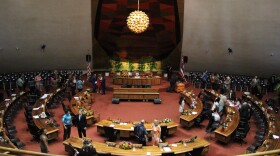Lawmakers will take up measures on gun laws, tourism management and government transparency in conference committees this week and next.
Conference convenes each year when the state Senate and House of Representatives disagree on amended versions of pending bills. Here, they have the chance to work out differences.
More than 400 bills have made it to conference committee, but not all will be discussed.
Virginia Beck, an administrator of the non-partisan Public Access Room, said conference is an opaque process.
Once a chamber disagrees with a bill's amendments, they have the opportunity to appoint conferees, but that's not always a guarantee, Beck said.
"There's no guarantee that they're going to actually appoint a conference committee, and if that happens, your bill dies because they don't have a way of figuring out what the final version of the bill should be," Beck said during an information session.
"Occasionally, you'll see they appoint conferees, and then later discharge them, release them, so that negotiations cannot continue," she said.

According to Beck, about 94% of the bills that made second crossover were amended.
Two bills dealing with the Hawaiʻi Tourism Authority are expected to come up this week. Possible closed-door discussions will include measures to dissolve the HTA, and replace it with a new state-run agency.
Rep. Sean Quinlan, the House tourism chair, said in a recent interview that the state needs to rethink the approach for its main revenue driver.
"HTA is in a tough position, they did their jobs so well that everybody's angry at them," Quinlan said.
He said the state expected HTA to bring in visitors, but there’s a negative connotation to bringing in too many.
"So I think it's really unfair, the sort of slings and arrows that HTA has taken over the last year, but I also think that we do need to update their mission," Quinlan said.
"I think that they must have a much stronger emphasis on destination management, and destination management is a very simple thing: it's an investment in our local communities and it's the idea that the Hawaiʻi taxpayer has to come first."
According to public testimony last week, the HTA has requested to stay in operation, with full funding of $75 million for the next fiscal year.





